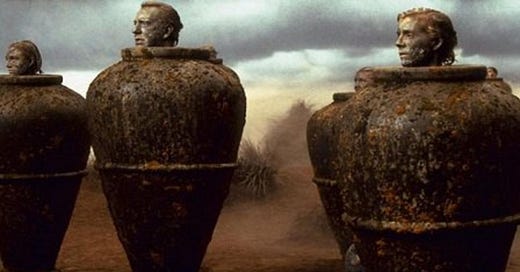Diary: Octavio Solis, Sam Beckett and I
Isolated by the pandemic, a playwright finds renewal in an unexpected place
Kristin Scott Thomas, Alan Rickman, and Juliet Stevenson in a film production of Beckett’s Play, directed by Anthony Minghella (2001)
“I am still alive then. That may come in useful.” —Samuel Beckett, Molloy
An insuperable trial, this pandemic. It descended on us with sudden force and turned 2020 into a year of death and desperation. All of us were thrust into paranoia, anxiety, and isolation. I fell terribly ill with the virus late that year as fires scathed our forests and towns. That amplified the misery of the year, but for me the chief misery was the collapse of my playwriting career, because all our theatres were indefinitely shuttered and I was seized with writer’s block. Really, how to be creative at a time like this?
I realized, however, that I had a lot of time on my hands to read, and there was a book on my shelf that called to me. Three Novels by Samuel Beckett: Molloy, Malone Dies, and The Unnamable. I was familiar with Beckett as a world dramatist of the first order; his famous works, Endgame, Happy Days, and Waiting for Godot were part of my theatre education and I’d seen them in some acclaimed productions. They represented the finest examples of the Absurdist movement in theatre, which included the plays of Eugene Ionesco, Jean-Paul Sartre, and Jean Genet. But Sam’s prose was alien to me. I resolved to read this triad of novels in succession, aloud to myself.
Keep reading with a 7-day free trial
Subscribe to Book Post to keep reading this post and get 7 days of free access to the full post archives.




